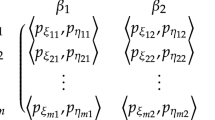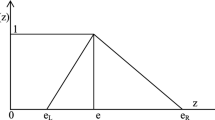Abstract
We aim to extend some results in [6, 7, 8, 2] on two person zero sum matrix games (TPZSMG) with fuzzy goals and fuzzy payoffs to I-fuzzy scenario. Because the payoffs of the matrix game are fuzzy numbers, the aspiration levels of the players are fuzzy as well. It is reasonable to believe that there is some indeterminacy in estimating the aspiration levels of both players from their respective expected pay offs. This situation is modeled in the game using Atanassov’s I-fuzzy set theory. A new solution concept is proposed for such games and a procedure is outlined to obtain the degrees of suitability of the aspiration levels for each of the two players.
Similar content being viewed by others
References
Angelov P P (1997) Optimization in an intuitionistic fuzzy environment. Fuzzy Sets and Systems 86: 299–306
Atanassov K T (1986) Intuitionistic fuzzy sets. Fuzzy Sets and Systems 20: 87–96
Atanassov K T (1989) More on intuitionistic fuzzy sets. Fuzzy Sets and Systems 33: 37–45
Atanassov K T (1994) New operations defined over the intuitionistic fuzzy sets. Fuzzy Sets and Systems 61: 137–142
Atanassov K T (1999) Intuitionistic fuzzy sets, Springer-Verlag, Heidelberg
Bector C R, Chandra S (2002) On duality in linear programming under fuzzy environment. Fuzzy Sets and Systems 125: 317–325
Bector C R, Chandra S, Vidyottama V (2004) Matrix games with fuzzy goals and fuzzy linear programming duality. Fuzzy Optimization and Decision Making 3: 255–269
Bector C R, Chandra S, Vidyottama V (2004) Duality in linear programming with fuzzy parameters and matrix games with fuzzy payoffs. Fuzzy Sets and Systems 146: 253–269
Bector C R, Chandra S (2005) Fuzzy mathematical programming and fuzzy matrix games. Springer-Verlag Berlin
Bellman R E, Zadeh L A (1970) Decision making in a fuzzy environment. Management Sciences 17: 141–164
Compos L (1989) Fuzzy linear programming models to solve fuzzy matrix games. Fuzzy Sets and Systems 32: 275–279
De S K, Biswas R, Roy A R (2001) An application of intuitionistic fuzzy sets in medical diagnosis. Fuzzy Sets and Systems 117: 209–213
Dubois D, Gottwald S, Hajek P, Kacprzyk J, Prade H (2005) Terminological difficulties in fuzzy set theory-the case of intuitionistic fuzzy sets. Fuzzy Sets and Systems 156: 485–491
Grzegorzewski P, MrÓwka E (2005) Some notes on (Atanassov’s) multiobjective fuzzy sets. Fuzzy Sets and Systems 156: 492–495
Li D F (1999) A fuzzy multiobjective approach to solve fuzzy matrix games. The Journal of Fuzzy Mathematics 7: 907–912
Li D F (2005) Multiattribute decision making models and methods using intuitionistic fuzzy sets. Journal of Computer and System Sciences 70: 73–85
Li D F, Nan J X (2009) A nonlinear programming approach to matrix games with payoffs of Atanassov’s intuitionistic fuzzy sets. International Journal of Uncertainty, Fuzziness and Knowledge-Based Systems 17: 585–607
Nan J X, Li D F (2010) A lexicographic method for matrix games with payoffs of triangular intuitionistic fuzzy numbers. International Journal of Computational Intelligence Systems 3(3): 280–289
Nishizaki I, Sakawa M (2001) Fuzzy and multiobjective games for conflict resolution. Springer, Physica-Verleg, Heidelberg
Szmidt E, Kacprzyk J (1996) Remarks on some application of intuitionistic fuzzy sets in decision making. Notes on IFS 2: 2–31
Vijay V, Chandra S, Bector C R (2005) Matrix games with fuzzy goals and fuzzy payoffs. Omega 33: 425–429
Vlachos I K, Sergiadis G D (2007) Intuitionistic fuzzy information-applications to pattern recognition. Pattern Recognition Letters 28: 197–206
Yager R (1981) A procedure for ordering fuzzy numbers of the unit interval. Information Sciences 24: 143–161
Zimmermann H J (1991) Fuzzy set theory and its applications. Kluwer Academic Publishers, Dordrecht
Author information
Authors and Affiliations
Corresponding authors
About this article
Cite this article
Aggarwal, A., Dubey, D., Chandra, S. et al. Application of Atanassov’s I-fuzzy set theory to matrix games with fuzzy goals and fuzzy payoffs. Fuzzy Inf. Eng. 4, 401–414 (2012). https://doi.org/10.1007/s12543-012-0123-z
Received:
Revised:
Accepted:
Published:
Issue Date:
DOI: https://doi.org/10.1007/s12543-012-0123-z




